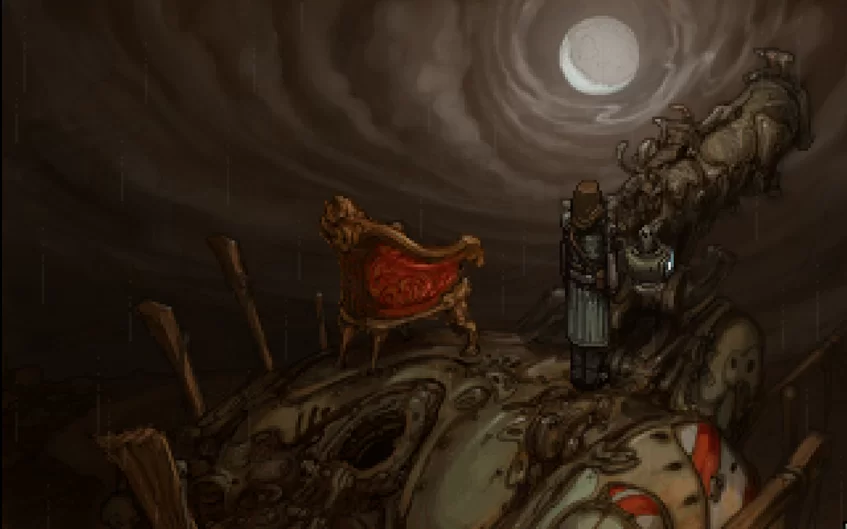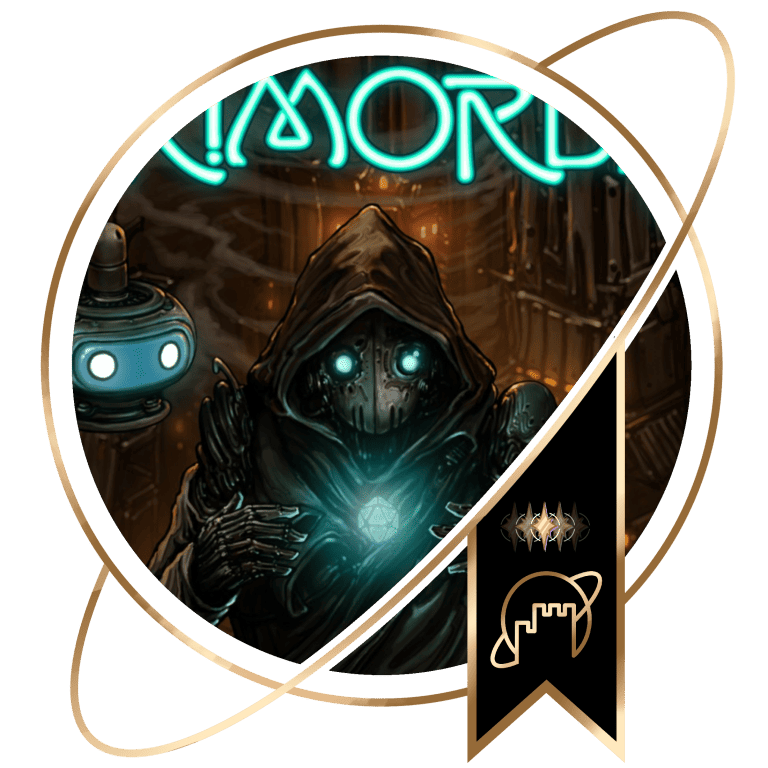
Collected on: September 24th 2023
- Video game developed by Wormwood Studios
- Directed by Mark Yohalem
- Published by Wadjet Eye Games
- Published in 2012
- Point-and-click adventure
- Playing time: 6-8 hours
- Platforms: Microsoft Windows, MacOS, Linux, iOS
Collected: Primordia is a beautiful and atmospheric point-and-click-game, following the story of Horatio Nullbuilt, an android living in a crashed ship in the desert wasteland, who has his life turned upside down when a hostile robot steals his ship’s power core. Horatio is determined to scavenge the post-apocalyptic wasteland for a new core, but Crispin, his self-built sidekick, suggests that perhaps it would be easier to find one in Metropol, the city of glass and light…
Jop: Welcome to this in-depth, spoiler-free discussion of the video game Primordia, which our curator Peter has added to the Escape Velocity Collection, a series of items that we believe represent the absolute peak of what the speculative genre has to offer.
I challenged Peter to defend his addition to the Collection – why should everyone pick up this point-and-click pixel art game about robots?
The first time I played this game was together with our shared friend Matt – I’m always a fan of playing these kinds of puzzle games together so you can bounce ideas off each other. I have really fond memories of trying to figure out some of the game’s challenges together. I remember I was on my bike cycling home and calling Matt to restart the game and try something because I had an epiphany – and it worked!
Since then, I’ve also played the game with/gifted the game to a bunch of other people, including my dad – and I’ve yet to find someone who didn’t like it.
I think Primordia does so well because (i) it is just a good point-and-click adventure, and (ii) because this simple pixel art indie game is perhaps the most atmospheric gaming experience I’ve ever encountered. The pixel art, the design, the music, the voice acting… It all works amazingly well, and you can get all that for just a couple of Euros. Who needs big 70 euros triple-AAA disasters upon launch if you can get lost in the world of Primordia?
Gameplay
We’ve already shared that Primordia is a point-and-click adventure game. This means that most of the gameplay can be summarized as “click on this object or that person to interact with it”. Most people wouldn’t consider this flashy or challenging, I believe.
That I’m not too picky about gameplay mechanics is already established, but I believe you’re usually more critical in this regard. If I remember it correctly, you didn’t care much for the point-and-click mechanics in Telltale’s The Walking Dead, for example. What did you think of these mechanics in Primordia?
Well, I think Primordia’s gameplay is probably best described as ‘good enough’, which seems faint praise but really, a point-and-click game kind of has a low ceiling when it comes to quality of gameplay. It is, more or less by definition, really simple. No, not all of the puzzles are equally intuitive, but most of them can be figured out within a couple of minutes of brainstorming. I don’t remember ever getting really stuck, or having to consult the all-knowing internet for a solution (also known as ‘cheating’).
What I like about Primordia (and, for that matter, Strangeland, Wormwood’s other point-and-click-game) is that the game recognises that the player might get stuck, and allows them an in-game mechanic for getting hints. In Primordia, that’s clicking your companion Crispin, who is generally not that bright (pun intended) so having to resort to him for help seems punishment enough in and off itself.
The existence of this mechanic also shows that the creators weren’t too bothered about the ‘challenge’ but encouraged players to keep moving in the story and explore more of the world.
You reference The Walking Dead, and while I liked that game, I remember experiencing more of a – fancy term incoming – ludo-narrative disconnect, that is to say, feeling like the player’s actions made little sense in the game world. The Walking Dead constantly puts the player in narratively time-sensitive situations that are not reflected in the gameplay. Similarly, the controls of The Walking Dead mirror those of a third person action game far more closely, while really not allowing for much action. Now, The Walking Dead is a far more cinematic type of game, so I suppose it all makes sense. But the result was that The Walking Dead put me in the mindset of an action game without actually delivering on that promise, while Primordia is just… utterly relaxing. The developers’ commentary to Primordia actually mentions their decision making process and choice not to include time-based gameplay in the game, and I couldn’t agree more with that decision.
You already briefly mentioned the puzzles and how they – or at least a majority of them – are not likely to make you smash your computer due to helplessness to solve a dilemma. I tend to agree, though I’m not ashamed to admit that some of them had me walk in circles for a long while before I thought of a way forward. Though I’m too stubborn a person to give up in those circumstances, I can imagine that a sparring partner or – as you call it – a little cheating might benefit others in retaining their sanity.
Something I think is worth mentioning in regards to the puzzles; some of them can have an impact on the game’s endings (yes, there are multiple possible endings in this game). I only discovered this after finishing the game, and when I spoke to you about it, even you seemed a little surprised. As I’m always a big fan of choice matters and different endings in games, I loved it. Still, one might argue that it’s somewhat unfair to block unwitting players from certain endings, depending on how they solved specific puzzles. What do you think of this feature?
I absolutely love it! I think it is a great example of the hidden depth in this seemingly simple game. I remember the first time I spoke to someone else who finished the game, and we were so confused, until we figured out it just hadn’t ended the same way for both of us.
Sure, most of the game will be more or less the same for everyone – but the fact that some things change – that you can get some things ‘right’ or ‘wrong’ without triggering a ‘game-over’-type fail state, the fact that you can (sometimes quite literally) short-circuit some of the puzzles but as a result might miss out on some lore or disappoint one of the characters – it all adds to the subtle feeling that the world is real and you’re not just clicking through some screens to get to the credits.
I’m not claiming that Primordia is a work of philosophy, but at times, the game asks some surprisingly ‘deep’ questions and I am glad the answers you give to some of those are reflected in the conclusion.
I don’t mind that it is not something you necessarily know about on your first playthrough – though I guess we’ve spoilered it here – but I think it helps prevent metagaming: people making certain choices not because of the choice but because of the ending they want to get to. If you’re going into a game like Primordia with that kind of mindset, trying to ‘optimise’ at every juncture, I think you might ruin the experience for yourself.
Setting and Art
I agree that the setting may sound unoriginal at first description – there are plenty of robot-survives-man-type post-apocalyptic stories out there (Sea of Rust immediately jumps to mind as a pretty similar example).
What makes Primordia special is not so much the premise as the execution. It looks gorgeous. Primordia is a modern pixel art game with a very limited blue-brown-orange colour palette: brown-orange for the desert and the rusted junk that makes up the world; blue for polished steel and the light emanating from power sources. The limited colours really unify the world and drive home a particular feeling of silent and slow decay. Simple rain animation makes a place like the junkyard really feel like the most dreary spot in the desert. Moreover, the design of all the machinery, with slightly weird, knobbly, almost jugendstil-ish vaguely organic rounded shapes is just phenomenal. Primordia really has its own, recognisable style that I’ve not found anywhere else. The game is so simple, and yet the world looks so good – perhaps the world looks so good because the game gives you plenty of time to look at it.
I also really like the sound design and voice acting. Horatio and Crispin’s banter is top notch, and so are some of the other characters (I love Ever-Faithful’s disappointed ‘but nay wanderer…’) You often hear haunting, tinny voices over the radio or record player to fill the silence, really adding to the vaguely unsettling post-apocalyptic world. The same goes for the music. I’ve listened to the soundtrack a thousand times, I think. It is this great mix of more creepy, heart-thumping music and really relaxing tunes that make you want to sit in that beautiful chair on top of the Unnic and go stargazing for an evening.
Characters
I would argue that Primordia is ultimately the story of one character, namely that of Horatio, the character the player gets to control. A hermit scavenger with a past that seems a mystery even to him. As the game progresses, you get the chance to discover more of his background and get a say in what Horatio’s future might look like.
It didn’t take long for me to grow fond of Horatio. His voice, gruff demeanour and cynical humour reminded me very much of The Witcher’s Geralt, and – as you already mentioned – his banter with sidekick Crispin is a delight to witness. But also, I was invested in his quest. Thematically, I would say his story revolves around the question if one can escape their past. Can we forge a new path forwards for ourselves? Or are we forever bound to our initial programming?
What do you think of Horatio as a protagonist? Do you agree with my analysis?
Hahaha, I can see some of why you would compare Horatio to Geralt, but I think we should manage expectations here – he is not as good-looking as Henry Cavill, and I feel like Horatio is a lot kinder than Geralt at heart. I feel like, if he didn’t have to, Horatio wouldn’t hurt a fly, wouldn’t meddle in anyone’s affairs, and would just sit on that chair I mentioned before and enjoy the quiet of the wasteland. If S.C.R.A.P.E.R. hadn’t interfered, none of the game would have happened and he and Crispin would still happily be tinkering away at the UNNIC.

I suppose that is at least a part of why I was so engaged with Horatio’s struggle with his past. Without giving too much away, I don’t think Horatio likes what he learns about himself very much. And yet, like Horatio himself, the player is driven by a sort of inevitable curiosity to find out more. Again, I don’t want to spoil too much, but I think that the players gets to answer some of the questions you mention – whether you can be free of the past – themselves in the final sequences. But I really shouldn’t say more.
Yeah, I love Crispin. <3 He is the best, the very best. I wish I could hug him. I would seriously consider building a life-sized Crispin just to have him around in my life and encourage me with snarky lines on his lack of arms and occasionally not too bright comments.

Which actually makes me think. Wouldn’t a Primordia cosplay be AMAZING? I think it would actually be doable, though Horatio with his long coat and hood would be a lot easier than Clarity or some of the other characters. S.C.R.A.P.E.R. is just a box with arms, basically. I guess you’d have to find a dog or someone willing to crawl on all fours to be Ever Faithful… That’d be a project. It’d just be a pity that probably no-one would recognise who you were… which is a damn shame because they should all be playing Primordia!



